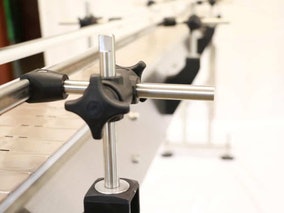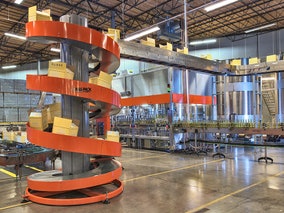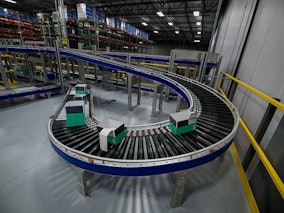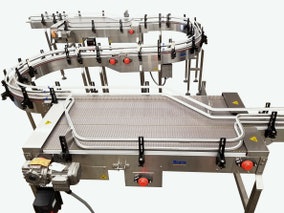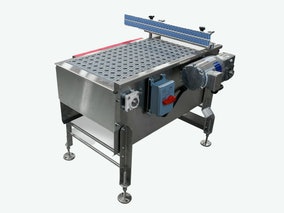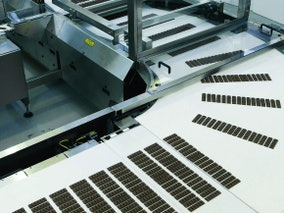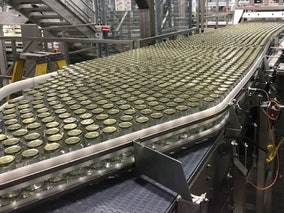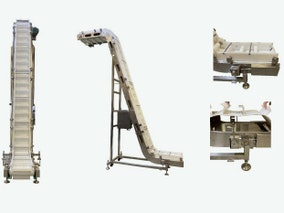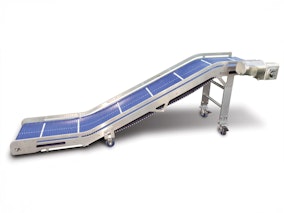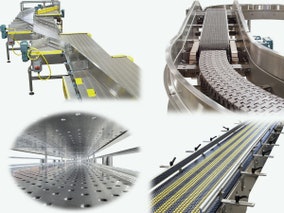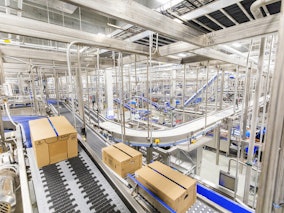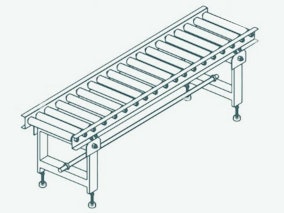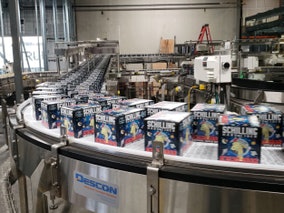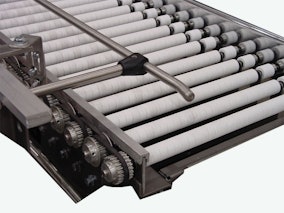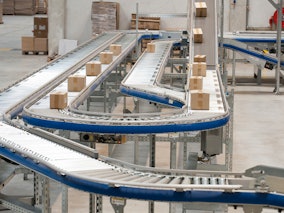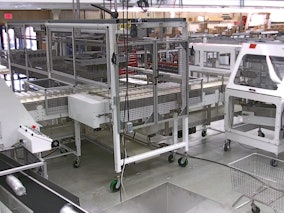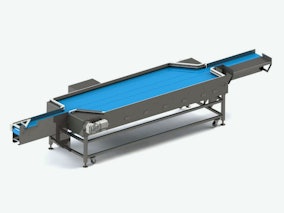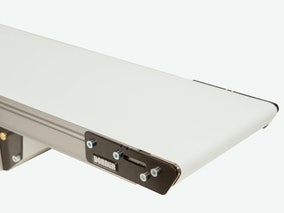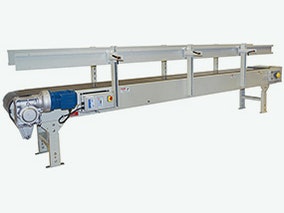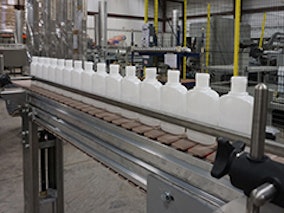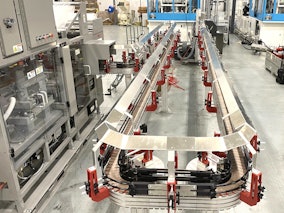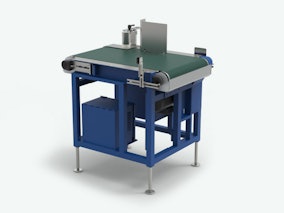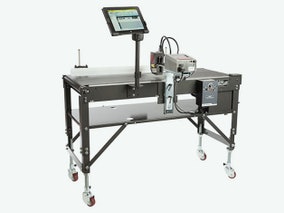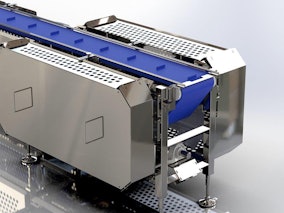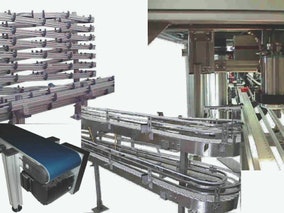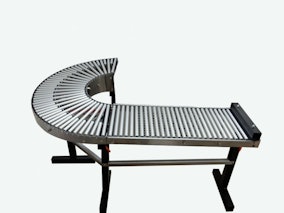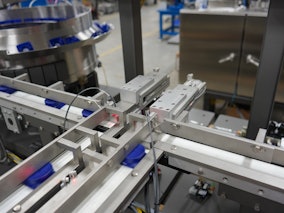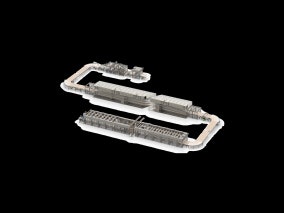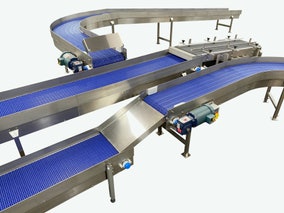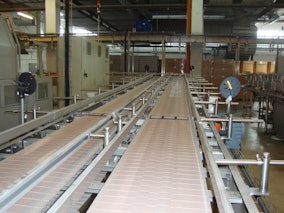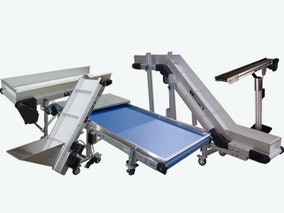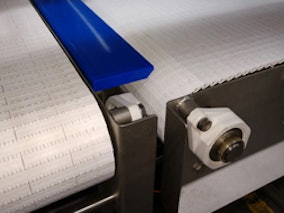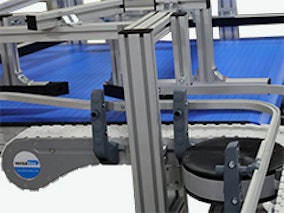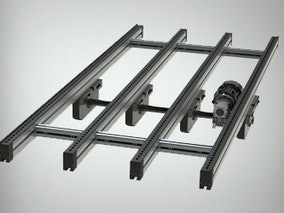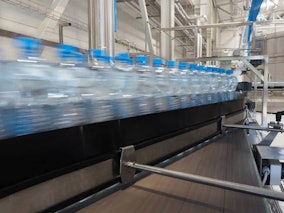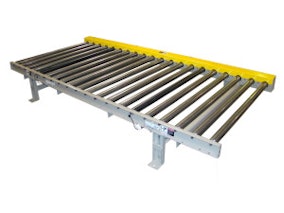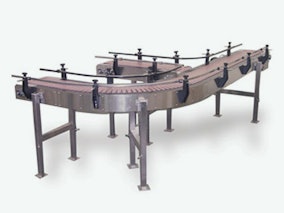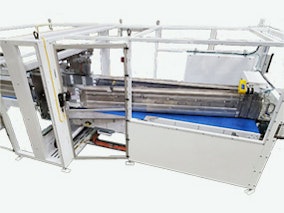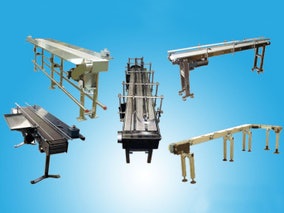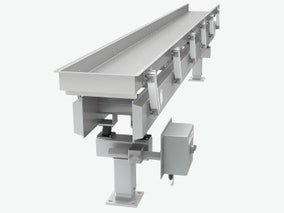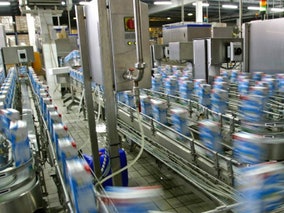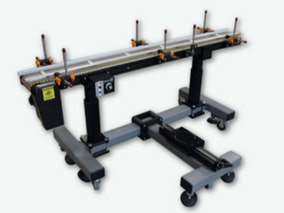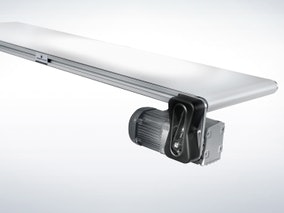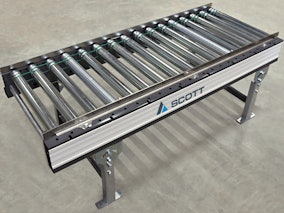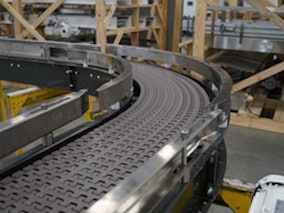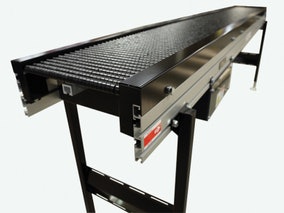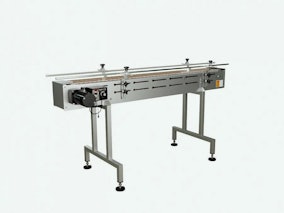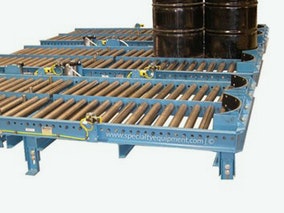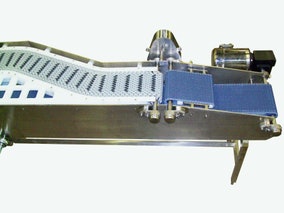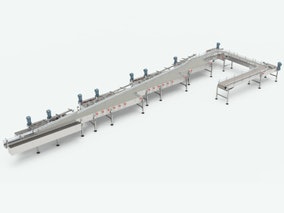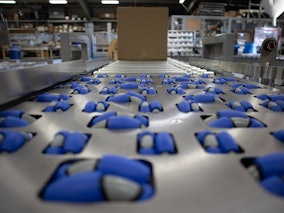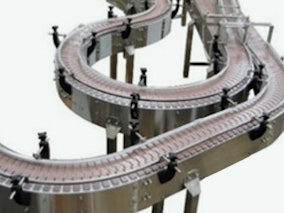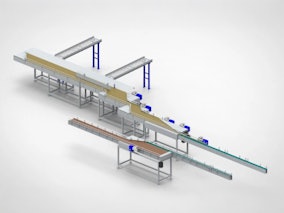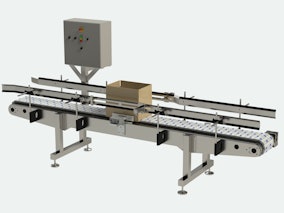Roller Conveyors
(65 companies)Lineshaft or roller conveyors feature cylindrical rollers that move primary cartons or secondary packaging such as cases, through a production line. Plan to purchase new conveying, feeding and handling equipment? Explore our articles to get tips.
-

ABM Equipment
ABM Equipment designs, builds, and integrates all types of conveyance systems from belt and screw to tubular drag and pneumatics.
You are currently not logged in -

Accutek Packaging Equipment Co., Inc.
Accutek specializes in manufacturing customizable conveyor systems, available in both open top and closed top sanitary designs. Accutek conveyors can be tailored to fit any desired length or width, providing flexibility to meet specific requirements. Each conveyor is constructed using robust stainless steel materials, ensuring durability and longevity. Additionally, Accutek conveyors feature height adjustable stands and variable speed drives, allowing for precise control. Whether the customer needs an open top or closed top sanitary design, Accutek offers a wide range of lengths and widths to accommodate diverse needs.
You are currently not logged in -

Advantage Conveyor, Inc.
Advantage Conveyor supplies a vast range of custom and modular conveying equipment for food and beverage, pharmaceutical, cosmetic and consumer industries. Machines include tabletop conveyors, singulating and combining conveyors, indexing conveyors, bucket conveyors, roller and ball transfer conveyors as well as a complete line of conveyor accessories such as gates, pushers, flow rails, guide rails and much more.
You are currently not logged in -

Aesus Inc.
Aesus Inc. is a supplier of conveying machinery and related parts and components. The Aesus product line includes economy belt conveyors, pack-off tables and turntables as well as conveyance components such as wireways.
You are currently not logged in
-

Alstef Group
Alstef Group offers a full range of conveyor technology to move, sort, distribute, inspect, receive, ship, or inventory for e-commerce, food, pharmaceutical, and other industries. Sorting technology for applications ranging from small to high volume is integrated with Alstef Group's conveyor systems.
You are currently not logged in -

Apex Filling Systems
Conveyors from Apex Filling Systems are available in a wide array of configurations to handle varying sizes, shapes and materials of demanding bottling machine applications. The traditional stainless steel SC series conveyor comes standard with a 4.5-in. Acetal chain in 5-, 10- ,15-, and 20-ft. lengths, feet, with custom lengths also available. The SC series conveyors are variable speed, gear-driven and constructed of heavy duty 304 stainless steel. Modular design of the Apex SC series conveyor allows for easy integration into existing equipment now or for additional sections to be easily added in the future. Options include curved 90/45 degree sections for L, U, and S shapes, sanitary construction (elevated chain, to facilitate washdown), and TEFC washdown-duty motors and controls.
You are currently not logged in -

APS Packaging and Automation
APS Packaging & Automation designs and manufactures a wide range of conveyors for any kind of package. APS Packaging & Automation's product line includes conveyors featuring stainless steel frameworks, guide rails with a low friction coefficient and sensors that detect the presence of containers. The company can also optimize the flow of the containers to obtain a optimum feed to other packaging machines in the line.
You are currently not logged in -

Ashworth Bros., Inc.
Ashworth Bros., Inc., headquartered in Winchester, Virginia, manufactures and services both metal and plastic conveyor belting for straight running, turn-curve, low-tension and self-stacking spirals.
You are currently not logged in
-

Bastian Solutions
Bastian designs conveyor systems that replace manual transport processes, creating more reliable, ergonomic, and organized operations. Whether purchased as standalone pieces of equipment or as part of larger automated systems, Bastian Solutions conveyors increase throughput, relieve bottlenecks, and maximize the productivity of the labor force. Conveyors can help automate a variety of processes, including transporting, sorting, loading, unloading, palletizing, order fulfillment, and more.
You are currently not logged in -

Bevco Sales International
Bevco conveyors are specialized for the food, beverage and consumer goods industries. Conveyor products, including tabletop, mat-top, air/pneumatic conveyor, and six-lane variety pack conveyors, are engineered to move containers and packages of various sizes along processing lines with maximum efficiency and reliability. Bevco offers custom designed conveyors to suit production needs of their customers.
You are currently not logged in -

Boston Conveyor & Automation (An Mpac Group Company)
Boston Conveyor & Automation manufactures stainless steel conveyors that meet a wide range of industry standards, from wipedown construction for GMP and packaged product handling to fully welded sanitary conveyors for the most stringent USDA and EHEDG applications. Product line includes wipedown conveyors, washdown conveyors, sanitary conveyors and ultra sanitary conveyors. Product line accommodates belt types ranging from modular plastic to table top chain, fabric, homogenous, and wire belts. Boston Conveyor & Automation also offers switching conveyors for horizontal, multi-lane and vertical multi-lane applications.
You are currently not logged in -

Bradman Lake Inc.
Bradman-Lake designs fully automatic distribution systems and row feed stations that offer flexibility in operation and are capable of accepting normal irregularities in the product itself and the product supply rate for food processing, candy processing and related applications. Engineered to handle delicate, sticky, friable and fractious products, Bradman-Lake’s Automatic Distribution Systems (ADS) are designed to effectively present product to the next stage of the wrapping cycle. Row feed stations are specifically developed for production and packaging lines. As each row is transferred onto the primary belt, they are conditioned by a pneumatic/servo row aligner, depending on speed.
You are currently not logged in
-

BW Packaging
BW Integrated Systems offers a broad range of conveyor systems that are manufactured to handle an array of products, including full and empty cans, bottles, cases, multi-packs, flexible products and more. Systems range from vacuum and air conveyance to traditional tabletop in both mass flow and single file configurations. BW Integrated Systems has over 50 years of conveyor, system control and line design experience.
You are currently not logged in -

CAM Packaging Systems
Horizontal, vertical, incline and bucket conveyors are designed for a wide range of packaging applications. Co. also builds custom conveyors and carries standard sized conveyors. Featured conveyors include a bucket conveyor to move product from ground level up to the scale or counting system.
You are currently not logged in -

Chantland MHS
Conveyors from Chantland MHS include bag handling conveyors and flatteners, bulk and incline conveyors, in addition to a wide range of package handling conveyors. Packaging conveyors include king size portable conveyors, flat roller bed conveyors, floor-to-floor flat slider belt bed belt conveyors, and many more. Specialty bag application conveyors include closing conveyors for filled bags, bag transfer conveyors, roller bed bag flatteners, bag turners, bag kickers, stacker conveyors and many others. Custom designed conveyors for specialty one-of-a-kind applications are also available.
You are currently not logged in -

Coastal Manufacturing
Boost efficiency with Coastal Manufacturing’s custom stainless steel sanitary conveyors, engineered for food-safe processing and packaging. Coastal Manufacturing's stainless steel solutions are FSMA & USDA/FDA compliant, designed for durability, and feature easy cleaning and seamless integration into any production line.
You are currently not logged in
-

Container Handling Systems Corporation
CHSC conveyor systems offer a wide variety of design options to meet customer conveying needs. Products include table and mat top chain conveyor systems, air deck conveyors and Zone Touch zero pressure tabletop conveyors. CHSC also supplies cable conveyor systems for conveying metal cans. Related conveying systems include pressureless single filer systems as well as bi-directional and in-line flow accumulation tables.
You are currently not logged in -

D&F Equipment Sales, Inc.
D&F supplies mat top, rollers, ball transfer and other conveyors used in food processing as well as finished package and case conveyance. The DFGR50 gravity full box conveyor features 2-in PVC rollers. D&F also designs and custom fabricated conveyor and food handling systems.
You are currently not logged in -

DCC Automation
For over 70 years, DCC Automation has been a trusted provider of conveyor solutions for the food, beverage, and dairy industries. DCC Automation's hygienic, stainless-steel designs are built for durability, easy sanitation, and long-term efficiency, helping facilities reduce downtime and keep production moving. DCC Automation offers a wide range of systems, including tabletop, mat-top, air, and alpine conveyors, as well as custom sanitary designs tailored for specialized applications. Backed by expert service, aftermarket parts, and a legacy of engineering innovation, DCC Automation ensures your production line operates at peak performance.
You are currently not logged in -

Descon Conveyor Systems
Descon provides a complete suite of conveyor solutions for a range of applications, with a focus on the particular demands of the food and beverage industry. Featured systems include Descon’s full line of integrated case conveyors, designed for strength, rigidity and performance. Descon conveyor products also include plastic modular belting, low-back pressure type chains as well as accumulation and friction/non-friction top chains for braking.
You are currently not logged in
-

Dillin Automation Systems Corp.
Dillin Automation Systems supplies a range of conveyors handling numerous applications, including drag chain, belt-driven conveyors, mat top, slider bed belt, table top and roller conveyors. Featured conveyors include the Air Deck, which conveys and accumulates everything from candy, caps and cartons to pouches, bags and bottles with a 400 fpm throughput. Other conveyors include Soft-Touch, with a roller bearing design that allows low back pressure handling for a variety of products: cups, totes, slug, cartons and more. Conveyors can be supplied as standalone or integrated as a complete, customized system.
You are currently not logged in -

Dispac
Dispac offers a wide range of conveyors that handle bottles, cans, multipacks, cases and other packages. Tabletop conveyors are designed for the the efficient transfer of all types of materials or products. Conveyor styles include chain, plastic modular, roller, cable, magnetic, gravity, gripper conveyors and spiral styles.
You are currently not logged in -

DJS
DJS supplies hand loaded, indexing conveyor systems to handle bulk food service items, such as manually loaded products, such as cups, lids, plates and trays. For cup diverting, systems take a single lane of product and divert it into several different lanes, or divert several lanes down to a single lane. In the conveyor system, pre-counted stacks of trays, plates, or other items are loaded onto the indexing conveyor, which moves stacks along to an overhead loader. The overhead loader then loads the stack into a vertical bagger.
You are currently not logged in -

DMM Packaging, Inc.
DMM Packaging supplies rubber conveyor belts using industrial conveyor rollers in addition to being a custom conveyor equipment manufacturer. In addition to its belts and custom conveyors, DMM also engineers related equipment such as elevators and lowerators, accumulation tables and transfer elevators.
You are currently not logged in
-

Dorner Mfg. Corp.
Dorner’s conveyors are designed to move product to the exact location, at the exact time and in the exact position it needs to be for the next phase of the production line. Products include 1100 Series of miniature conveyors, the 2200 Series of low profile, high performance fabric and modular belt conveyors, the 3200 Series heavy duty, low maintenance conveyors, and the 7x Series of sanitary conveyors designed to improve food safety. Designed for precision conveyance, conveyors feature in-house belting capabilities. Dorner conveyors are designed to easily integrate with robots, workers and equipment.
You are currently not logged in -

Duravant
Duravant manufactures conveyors for every plant that handle applications ranging from upright bagging and turning/kicking, to conditioning, stacking and unique power curves.
You are currently not logged in -

Dyco, Inc.
Dyco offers custom conveying solutions including extensive cable conveyor systems for many industries and the patented modular aluminum Red Line tabletop bottle conveyor, designed for long runs and minimized chain surging.
You are currently not logged in -

Dyco, Inc.
Dyco tabletop conveyors are excellent for streamlining the transfer of materials or products. Dyco offers extensive tabletop conveyor experience and single-source fabrication, installation and service of systems it designs.
You are currently not logged in
-

EAM-Mosca Corporation
Complementing its line of strapping machines are specialty powered and gravity entry and exit conveyors. Conveyors feature controls to integrate production lines with strapping equipment as well as 90-degree transfer or bump turn options can rotate products for cross strapping or divert for storage or shipment. Conveyors and turning options can be fully integrated into an existing or new line.
You are currently not logged in -

Eastey
Eastey’s EC1248 and EC1848 variable speed conveyors are designed for reliable stand-alone product transport during product marking of primary or secondary products such as cases. Models are engineered to make a convenient add-on infeed or exit feed conveyor to existing case taping or shrink wrapping equipment, and can be integrated with inkjet printing equipment. Each conveyor comes pre-drilled in multiple locations to easily add printer and encoder mounting brackets. The smooth drive belt provides consistent speed for reliable, scannable barcoding and product transfer.
You are currently not logged in -

FEMC
FEMC offers a comprehensive range of premium conveyors, specially designed for food packaging and manufacturing automation. Their extensive selection of conveyor systems provides reliable and efficient solutions to streamline production processes while maintaining the highest standards of hygiene and safety. Conveyor solutions include flat belt conveyors, fixtured belt conveyors, and flighted belt conveyors. FEMC’s flat belt conveyors are engineered for versatility and ease of integration. Made from food-grade materials and featuring easily adjustable speed controls, these durable conveyors ensure smooth, continuous product flow in a wide range of food packaging applications, minimizing downtime and maximizing productivity. Fixtured belt conveyors are designed specifically for precision and accuracy in applications requiring precise product placement and orientation. Equipped with custom fixtures and adjustable guides, these conveyors guarantee gentle handling and optimal positioning of products, improving efficiency and reducing waste. FEMC’s flighted belt conveyors handle products with varying shapes and sizes. Featuring a series of cleats or flights, these conveyors securely transport items at inclines or declines without the risk of product spillage. Built with high-quality, food-safe materials, these conveyors maintain the integrity of products while ensuring a smooth, uninterrupted flow throughout.
You are currently not logged in -

Flex-Line Automation Inc.
FlexLink tabletop conveyors are built of stainless steel and aluminum. Company also offers hygienic solutions, mK belt and chain conveyors, Titan heavy duty roller conveyors and more. Featured products include the FlexLink conveyor system, designed for flexibility of product handling for industries that require delicate handling for smaller, more sensitive products like pharmaceuticals, aerosol cans, personal care products and more.
You are currently not logged in
-

Garrido USA
Garrido USA supplies conveyors, including 180 debris conveyors, flexible conveyors, belted conveyors, intermittent conveyors, belt to lug conveyors, roller conveyors and related equipment. The Advantage Machinery 180 Degree Conveyor is easy to set up and integrates well with Garrido’s Standard Heat Shrink Tunnels Series.
You are currently not logged in -

Hoosier Feeder
Hoosier Feeder Company offers a full line of conveyors to fit the application from robust and durable conveyors for heavy parts or light, flexible conveyance for high-speed applications. Platforms include belt, modular chain, wash-down food grade, and chain conveyors.
You are currently not logged in -

Houdijk North America, Inc.
Houdijk’s conveyor and accumulation systems form the critical link between oven output and packaging, delivering smooth, high-speed product handling. Their conveyors feature independent drives per section to ensure synchronization, accessibility, and ergonomic efficiency, and are engineered for gentle handling and easy cleaning. Accumulation buffers, including vibratory, inflow, and tray buffers such as FIFO Tray Buffer, absorb downstream stoppages and maintain line efficiency by providing temporary storage between processes. Systems integrate vision-backed monitoring to track product flow, detect shortages or jams, and support rapid, tool-free changeovers according to Poka-Yoke principles. The modular, hygienic design offers flexibility for future expansions, minimizing manning and maximizing throughput to keep biscuit and cookie lines running reliably from oven to wrapper.
You are currently not logged in -

ICON Robotics
ICON Robotics' JMP Engineering division is much more than an integrator of robots. JMP designs, engineers and manufactures most of the components that make up its systems. Whether for handling small lightweight items at ultra-high speeds or large cumbersome products, JMP Engineering can design and manufacture a conveying system that is efficient, easy to operate, and requires little maintenance.
You are currently not logged in
-

Laughlin Conveyor
Laughlin Conveyor offers a variety of conveyor system solutions for nearly every industry and application. Laughlin offers modular plastic belt conveyors, table top chain conveyors, composition belt conveyors, rod style metal belt conveyors, driven and gravity roller conveyors among other types.
You are currently not logged in -

Linker Equipment Corporation
Linker Equipment Corp. designs and engineers bottle conveyors for conveying different types of products between machines within the filling line. Linker offers air conveyors (applied in conveying of empty PET bottles), cable conveyors (for conveying empty cans), table top conveyors (for conveying empty or full cans and PET bottles), case conveyors (for carton plastic cases), and more.
You are currently not logged in -

MAC Automation Concepts
MAC Automation Concepts manufactures aluminum, stainless steel and powder-coated steel conveyors. Product line includes belt conveyors, roller conveyors, hopper conveyors, curved conveyors in low-profile, incline, horizontal incline, Z-style, and other styles.
You are currently not logged in -

Marchant Schmidt, Inc.
Specialists in cheese processing equipment, Marchant Schmidt also offers hygienic food grade conveyor systems that are continuously welded with special design provisions. When direct contact hygienic conveyors are not required but washdown is still important, Marchant Schmidt’s bolted construction conveyors can provide robust cleanable design. Marchant Schmidt also offers an extensive range of specialty conveyors with popular options include popup transfers, lane diverts and converger/divergers.
You are currently not logged in
-

mk North America, Inc.
mk North America provides a wide selection of standard and custom conveyors, as well as a full line of factory equipment, from chain and cleated belt conveyors to flat belt and modular plastic belt conveying systems. Company also offers conveyor engineering design services to help both end-users and integrators serve their industry requirements.
You are currently not logged in -

NCC Automated Systems
Glide-Line by NCC Automated Systems offers a comprehensive range of conveyors developed for product and package handling as well as automation integrators. From precision timing-belt transport to heavy-duty roller-chain pallets and multi-axis motion cells, the conveyors are engineered to adapt to virtually any layout challenge. Offerings include precision timing-belt conveyors in single-, dual-, and multi-strand configurations; heavy-duty roller chain conveyors for large workpieces; and the modular Glide-Line 360 system for flexible movement, sorting, and elevation. Additional options include FlexMove conveyors for multi-level transport and zero-contact zoned conveyors and vertical transport units for damage-free handling. These modular, configurable solutions enable efficient material flow, reduced downtime, and reliable performance across a variety of automation layouts.
You are currently not logged in -

Newmapak Ltd.
Newmapak offers a comprehensive range of Vetromeccanica conveyors, designed to optimize production lines across industries like food and beverage, wine and spirits, personal care, and more. These include air conveyors for lightweight empty containers, chain conveyors for stable transport, vacuum conveyors for precise movement. Vetromeccanica's modular conveyor designs accommodate various container shapes and materials, making them suitable for diverse production needs.
You are currently not logged in -

NorthAmCon, LLC
NorthAmCon, LLC Offers 24 VDC power driven technologies to meet an endless range of conveying applications with both Motor Driven Roller (MDR) and Flat Motor Driven Roller (FMDR) 24VDC technology.
You are currently not logged in
-

OK International Corp.
OK International specializes in custom-designed stainless steel food handling conveyors tailored to various industries, including bakery, meat, poultry, seafood, dairy, and produce. OK International's product line includes gravity roller conveyors with interchangeable rollers, belt conveyors featuring USDA/FDA-approved belts, table top conveyors with modular plastic belting, slat top chain conveyors suitable for diverse applications, and chain-driven live roller conveyors designed for heavy-duty use. These conveyors are engineered for easy cleaning and seamless integration with existing packaging machinery.
You are currently not logged in -

Pack Air Inc.
Pack Air offers conveying solutions for a wide range of industries, including paper/tissue/non-wovens, food and beverage, CPGs, health and hygiene, warehousing and distribution, end-of-line, industrial and specialty, and industrial controls. Their product portfolio encompasses conveyor systems with mild steel, plastic, and stainless steel construction options, along with belts in various materials like fabric, rubber, and modular plastic. Pack Air also supplies air conveyors, zero tangent modular belts, and custom-fabricated solutions, as well as control systems, specialty devices, and controls for conveyors.
You are currently not logged in -

Packaging Dynamics, Ltd.
Packaging Dynamics, Ltd. offers custom configured, job specific-sized conveyors. Supplier works with existing line layouts to offer customers a cost-effective solution to meet plant requirements. Conveyors can be equipped with transfer plates and product diverters as well as bi-directional and serpentine accumulators.
You are currently not logged in -

Pineberry Manufacturing
Pineberry Manufacturing supplies flat belt conveyors, vacuum conveyors, and lug conveyors engineered for consistent, high-speed product transport of packages. These systems are built to support a wide range of product types and packaging applications. Engineered for reliability and precision, Pineberry’s conveyors can be customized to meet specific production requirements, including indexing, spacing, and orientation. Whether used for standalone transport or integrated with other automation systems, Pineberry’s conveyor solutions help optimize material flow, reduce manual handling, and support continuous operation.
You are currently not logged in
-

PPM Technologies Holdings LLC, a Duravant Company
PPM offers a variety of conveyor types for the food-processing industry, ranging from belt conveyors to electromagnetic vibratory, mechanical, and horizontal motion types.
You are currently not logged in -

Precision Automation Company, Inc.
Precision Automation Company integrate conveyors from suppliers including Hilmot LLC, Roach Conveyors, TGW Conveyor Systems, Span Tech Conveyors and Daifuku Wynright. Range of conveyors are designed for a wide variety of products: cases, bottles, cans, pallets, drums, containers and more. Areas of expertise include sanitary food and beverage handling, conveyor systems for shipping applications, carton and case handling, and individual product conveying for food, beverage, pharmaceutical and consumer products. The process starts with the investigation and understanding of the customer’s needs. Precision Automation manages the entire conveyance project with thorough analysis, all the way through installation and training.
You are currently not logged in -

R. L. Craig
R.L. Craig's line of conveying equipment includes tabletop, split-belt, belt, mat top and end-to-end conveyors. In addition, R.L. Craig offers conveying accessories such as support rails, adjustable guide rails, uprights, support bases and related conveyor components.
You are currently not logged in -

Rexfab
Rexfab offers conveyor solutions for the entire production line. Rexfab can help automate high-volume production lines in the baking and food industries. Conveyor solutions are designed to meet all production and sanitary requirements. They feature stainless-steel construction for resilience and ease of cleaning, and modular plastic belting with a variable AC gear motor for optimal performance.
You are currently not logged in
-

Robotunits Inc.
Robotunits offers a wide variety of standard and custom conveyors with short lead times, including belt, modular belt, powered roller, transfer unit, turntable conveyors in addition to conveyor technology accessories and side guide systems. The variable Robotunits Lift Station enables the energy-efficient transport of products on two levels within industry and production areas, with standard conveying heights up to 5 m.
You are currently not logged in -

Scott Automation
Scott Automation provides a wide range of case conveyor systems for efficient handling of unit loads in material handling and logistics operations. Their offerings include belt, slat-chain, modular belt, and roller conveyors for horizontal and inclined transport, designed to perform reliably even in demanding environments such as cold storage or dusty facilities. For vertical movement, they offer slanted conveyors, spiral conveyors, index elevators, and platform elevators. The modular conveyor range features EvoLink control technology, enabling fast reconfiguration, real-time monitoring, and smart Industry 4.0 connectivity. EvoLink modules handle loads up to 50 kilograms and operate quietly on 24V DC, with easy maintenance and quick module replacement to reduce downtime and support flexible, high-efficiency production lines.
You are currently not logged in -

Sentry Equipment Erectors LLC
Sentry Equipment & Erectors supplies a range of conveyors, including tabletop, case conveyors, neck guided air conveyors for bottles and isometric air conveyors, as well as activated roller belts. Sentry's Pack conveyors are specifically designed for hard-to-handle packages, including multi-packs such as film bundles, decorated cartons, and banded six-packs.
You are currently not logged in -

Shuttleworth, LLC
Shuttleworth manufactures conveyor systems with a focus on infeed conveyors that work with shrink wrappers, cartoners, and case packers. Shuttleworth's Slip-Torque technology provides transportation and accumulation with minimal line pressure, preventing product scuffing, jamming, or shingling during infeed and discharge applications. Shuttleworth's durable and reliable sanitary stainless steel conveyor equipment is designed to operate in some of the most challenging environments. Company also supplies conveyor gates, guides, corners and curves, pushers and much more.
You are currently not logged in
-

Sneed Coding Solutions, Inc.
Sneed Coding Solutions supplies conveyors that help manufacturers seeking precise printing of date, lot, batch codes, and other vital product identification and traceability information. Sneed's wide selection of conveyors includes inline conveyors, bottomless conveyors, paging conveyors, and more. Sneed printers are thoughtfully designed for easy integration with various packaging equipment and machinery, including conveyors.
You are currently not logged in -

Specialty Equipment
Specialty Equipment supplies conveyors, specializing in moving bulk or heavy items such as drums and IBCs. Full drum conveyors convey and accumulate 55 gallon drums in single, double, or triple-lane widths. Other conveyors include wire mesh belt conveyors for conveying and indexing IBCs and other heavy items not conveyable on rollers or fabric belts. Chain conveyors handle unstable and tall loads of up to 2000 lb/unit load.
You are currently not logged in -

Stainless Specialists Inc.
SSi’s custom-made conveyors are used in a range of packaging applications for an wide variety of manufacturing and processing facilities, ranging from the food to the automotive industry. In addition to conveyors, SSi also offers a custom 3D scan within or around existing facilities or conveyors in order to measure the area around tight spaces to help reduce downtime during installation of new conveyors.
You are currently not logged in -

Statera
Statera offers a full range of product, case, and pallet conveyor technologies as well as customized conveyor sections for specific applications. Specialists in turnkey projects for complete or partial lines requiring single source accountability, Statera works with a wide variety of packaged goods industries including ready-to-drink beverages, bottled waters, nutritional products, distilled spirits, sauces and dressings, pet foods, automotive fluids, personal care products, and home care products. Product conveyor technologies accommodate both rigid and flexible primary packages including bottles, cans, jars, jugs, tubs, bowls, pouches, bags, and pails. Company also offers puck container handling systems for primary packages that require them. Statera MDR case conveyors are designed for corrugated boxes, cartons, trays, trays with shrink, bags, shrink bundles, or crates.
You are currently not logged in
-

System Technology, Inc
System Technology, Inc. offers a comprehensive range of conveyor systems designed for versatility and efficiency in various industrial settings. Their portfolio includes belt, roller, and modular plastic chain conveyors, powered roller conveyors, layer former conveyors, slider beds, square rollers, right angle transfer systems, spreading conveyors and many other models. System Technology tailors each of its conveying systems to transport products smoothly through manufacturing or packaging processes. These conveyors are engineered for durability and can handle lightweight or heavy-duty items with precision. Modular designs facilitate easy integration and scalability, while features like adjustable speeds and automated sorting enhance workflow efficiency. System Technology's conveyors are widely used in food and beverage production, pharmaceuticals, and consumer goods manufacturing, providing seamless transport solutions that optimize productivity and maintain high standards of quality.
You are currently not logged in -

Tessera Group Inc.
George A. Wright, a Tessera Group company, specializes in the design, manufacture and integration of customized specialty stainless steel conveyor systems, secondary product handling conveyors, CDLR roller conveyors, and 24 V DC roller conveyor systems.
You are currently not logged in -

Titans Packaging
Titans Packaging designs and manufactures tabeltop, gravity roller, accumiulation conveyors and other systems designed for food and beverage, pharmaceuticals, packaging, and manufacturing. Titans Packaging tabletop conveyors feature a modular design for low to medium-speed production, accommodating curves and elevation changes. Gravity roller conveyors offer a cost-effective material handling solution using gravity to move products, ideal for warehouses and distribution centers. Accumulation conveyors optimize product flow with options such as recirculating, mass flow, and single filing conveyors for buffering and organizing products. All conveyors are manufactured in the USA and can be customized to meet specific industry requirements, ensuring flexibility, reliability, and efficiency in conveyance.
You are currently not logged in -

TORFRESMA USA LLC
Torfresma manufactures hygienic and non-hygienic conveyor systems. Hygienic conveyor systems are utilized in fabrication and fully washdown areas in food facilities. These conveyors come standard with CIP (clean-in-place) capability and have a robust design. Non-hygienic conveyors are utilized in secondary processing areas for companies in the food and consumer goods industries. Torfresma also has a wide variety of sorters in its portfolio to transfer cases 90 degrees or 30 degrees. Torfresma conveyors utilize rollers and belting depending on the application.
You are currently not logged in
-

Trepko Inc.
Trepko offers conveyor systems featuring the TRAD slat belt system, which serves a wide range of functions in the food, techno chemical, and pharmaceutical industries. The conveyor is suitable for lightweight products and operates vertically, horizontally, or diagonally, with variable speed tailored to each application. Engineered for high efficiency, durability, and minimal maintenance, it proves ideal for challenging environments while ensuring easy accessibility. The conveyor system is modular, comprising drive units, straights, curves, elevations, legs, and guide rails, rendering it highly adaptable.
You are currently not logged in -

WeighPack Systems, Inc. / Paxiom
WeighPack manufactures a range of different types of conveyors for turnkey system integrations to help products dispense into packaging machines, containers or accumulation rotary tables. WeighPack’s container indexing conveyor is designed to automatically index and fill rigid containers including clamshells, bottles, jars and cans. Easily integrated with any filling device, the indexing conveyor features adjustable guide rail, a pneumatic indexing mechanism, an AC variable speed drive, container positioning sensors, no container/no fill features and more. WeighPack’s box indexing conveyor is designed for automatically indexing and filling corrugated boxes, trays and rigid containers, and can be integrated with any filling device. The exit conveyor, featuring a 304 stainless steel construction and a KB drive, is engineered to integrate with any automatic bagging machine to carry product from ground level to a rotary table or the operator.
You are currently not logged in
Report an Issue
Incorrect/inaccurate categorization? Report inaccuracies or problems »
Related Conveyors searches
More on Roller Conveyors
Explore the functionality and benefits of roller conveyors, which are essential for moving cartons and cases through production lines, and learn about their diverse applications and advantages.
Roller conveyors are integral components in the movement of primary cartons or secondary packaging like cases throughout various stages of a production line. These systems utilize cylindrical rollers to facilitate the transportation of goods, ensuring a smooth flow from one point to another within the manufacturing or packaging process. The design and operation of these conveyors make them suitable for a wide range of industries, including food and beverage, pharmaceuticals, and consumer goods.
The basic mechanism of a roller conveyor involves a series of rollers that are mounted on a frame. These rollers rotate around their axes and are typically powered by a lineshaft, a long shaft that runs the length of the conveyor. The shaft is driven by a motor, which transfers power through belts or chains to the rollers, causing them to rotate. This rotation enables the rollers to move objects placed on them along the length of the conveyor. The simplicity of this design allows for easy maintenance and adjustment to accommodate different sizes and weights of packages.
Roller conveyors are particularly useful in settings where there is a need to transport goods between different points without manual intervention. They are commonly found in distribution centers, warehouses, and assembly lines where efficiency and speed are crucial. The ability to integrate these conveyors into larger automated systems makes them invaluable in modern production environments. They can be configured in various layouts, including straight, curved, and inclined paths, to optimize the use of space and facilitate the flow of materials.
One of the primary benefits of using roller conveyors is their ability to improve the efficiency of material handling operations. By automating the movement of goods, these conveyors reduce the need for manual labor, thereby minimizing labor costs and enhancing productivity. Additionally, they help in reducing the risk of injury associated with manual handling of heavy or bulky items. Roller conveyors are also adaptable to different operational needs, with adjustable speed settings and the ability to handle various package sizes and weights.
For professionals looking to enhance their production lines with efficient conveying solutions, exploring various suppliers and manufacturers of roller conveyors is advisable. PMMI's ProSource directory offers a comprehensive list of companies that specialize in
these systems. This resource can be invaluable for comparing different offerings and finding the right equipment to meet specific operational requirements.
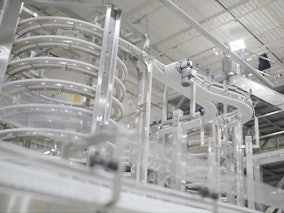
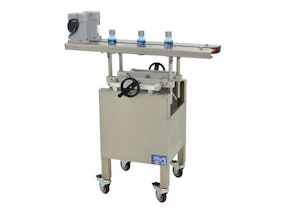
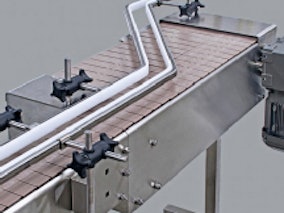
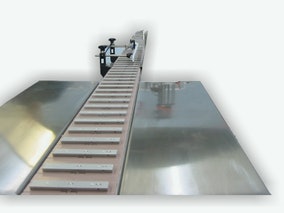
%20-%20Conveyors.jpg?ixlib=js-3.5.1&auto=format%2Ccompress&q=70&w=284&h=213&fit=crop)
